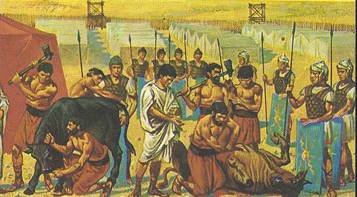ALL HIS LIFE Cardinal Richelieu had been a sick man, but by the spring of 1642 he was dying. He carefully made his will, leaving to the king his elegant town house, eight sets of tapestries‚ and three beds. On December 2, he received the last sacraments of his church. “Does your Eminence pardon your enemies?” asked the priest and Richelieu answered, “I have no enemies but those of the State.” When Louis XIII learned that Richelieu had died, he said, “A great statesman is dead.” To take Richelieu’s place, Louis chose Jules Cardinal Mazarin, Richelieu’s own choice for his …
Read More »Tag Archives: Apollo
The End of the City A. D. 192 – A. D. 476
ON ROME’S first day, Romulus took a bronze plow and drew a magic circle around seven of the hills that stood beside the River Tiber. The magic of the circle was protection against the evils outside. More important, it bound together the people who were inside, making one city where there had been six towns. Seven hundred years later, Augustus drew another magic circle, this time around all the Mediterranean world. It kept out barbarian and Asian invaders and held together millions of people, making one empire where there had been dozens of races and nations. So long as the …
Read More »The City of Augustus 29 B. C. – A. D. 14
IN 29 B.C. the gates of war were closed. Rome was at peace. Senators and the people of the mob-men who had hated and fought each other through long, bitter years — stood side by side in the Forum while the great doors of the temple of Janus were slowly pushed shut. That had happened only twice before in the history of the city. The crowd in the Forum cheered the peace and they cheered Octavius, their new ruler. He was no longer the young man who had rushed to Rome after the murder of his uncle, Caesar. Seventeen years …
Read More »The Greek Way of Life 700 B. C. – 343 B. C.
In the first years of Spartan peace, Greece was filled with wandering soldiers. Their little cities needed them no more. The new governments, which Spartans appointed, looked on them as men who might make trouble and were quick to get rid of them. Homeless and with no way to earn a living, the old campaigners roamed from place to place. They became soldiers of fortune, men who fought for any general or city that offered pay and three meals a day. In 401 B. C., ten thousand of them hired themselves out to Cyrus, a prince of Persia, who hoped …
Read More »Gods and Heroes 800 B.C. – 550 B.C.
From island to island and town to town, across the wide new world of the Greeks, the minstrel wandered, with a harp slung across his back and a batch of stories in his hand. When he knocked at the gate of a palace or great house and offered to sing for his supper, he was never refused. There were no shows to see and no books to read. The people relied on the minstrels to entertain them and to tell their stories of the past, which otherwise might be forgotten. The minstrel’s stock of stories was a mixture of tall …
Read More »



